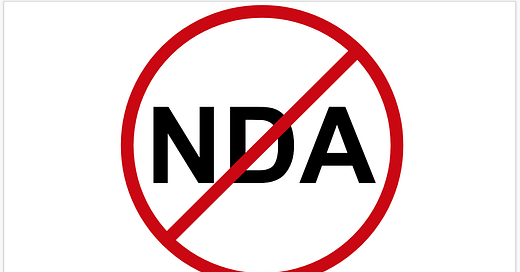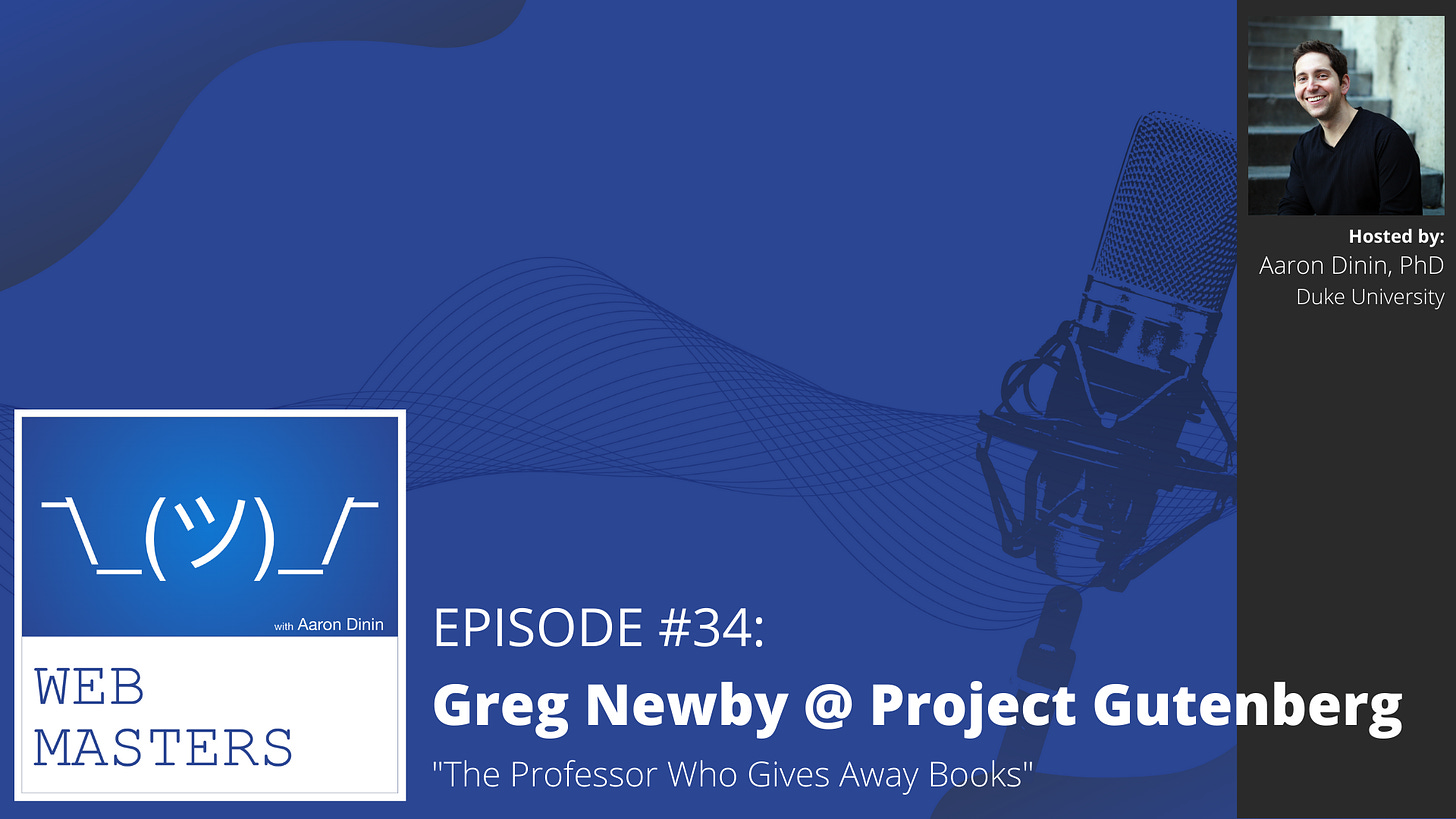Entrepreneur Office Hours - Issue #31
Just say "no" to NDAs, just say "yes" to ebooks, and learning to "settle" for $50 million businesses
This week’s Q&A touched a nerve for me because, while not the main focus of what the entrepreneur wanted to know, it included a question about NDAs. In case you missed it, here’s a piece I wrote a while ago that summarizes my thoughts on NDAs called “10 Things an Investor Would Rather Do with Your NDA than Sign It.” I’m particularly proud of Number 10…
Also this week I got to please my inner literature nerd by speaking with Greg Newby who runs Project Gutenberg. Project Gutenberg, in case you haven’t heard of it, is the oldest digital resource library and contains over 62,000 free ebooks. If you’ve never seen it, go have a look. I guarantee there’s at least one book in there you’ll enjoy. Probably a few (thousand) more than that, too.
Lots of questions have been coming in over the past few weeks that aren’t good for the public Q&A, but I still plan to answer them. Sorry it’s taking a little while, but, I promise, if you haven’t heard from me, you will.
And if you have other questions you want answered, keep sending them. Find my on Twitter, message me on LinkedIn, or just press the big ole’ reply button on this email.
-Aaron
I Sacrificed a $50 Million Company to Chase a Billion Dollar Business, and It Didn’t End Well
Note every company is meant to be a unicorn, and that’s OK. Unfortunately, it took me a failed company before I finally learned my lesson.
The Professor Who Gives Away Books
Did you know the first ebook was launched all the way back in 1971, before the Internet existed and more than two full decades before the World Wide Web? That ebook would lead to Project Gutenberg. It has over 62,000 free ebooks and is the world's oldest digital resource library.
Hear the story from the person who runs it, Greg Newby. Listen now on:
…or search “Web Masters” wherever you listen to your favorite podcasts.
How to Get Better at Customer Acquisition
Even though entrepreneurs have to do lots of jobs, the most important one is customer acquisition. Don’t forget that the better you are at getting customers, the easier everything else becomes.
How to Figure Out If Your Startup Is Growing Fast Enough
The timescale for startup growth is a lot different than most entrepreneurs think. That’s important to remember because if you don’t measure your growth properly, you might end up quitting on your company too soon.
Office Hours Q&A
———————
QUESTION:
I’m hoping you can help me with the best ways to protect my idea from being stolen and copied. Is a patent the best way to secure my intellectual property? And what about non-disclosure agreements (NDAs)? Once I have a patent, would I even need an NDA? Should I always ask people to sign NDAs before getting my patent? And what is the best way to file for a patent? I have read that patents can be very expensive and time consuming, but it is possible to do them yourself. Would you recommend figuring out how to do it yourself? Or would you suggest paying the high cost of a lawyer?
-Arvin
------------------
Let’s get the important legal caveats and disclaimers out of the way first: I am not a lawyer, and the following advice does not, in any way, constitute legal advice. It is purely my opinion and should be treated as such. For any legal advice, I highly encourage you to consult with a lawyer.
With that taken care of, I love these kinds of questions because, for me, they usually suggest the founder is focused on the wrong things.
In general in the startup world, ideas aren’t valuable and don’t need to be patented. Plus, when you do patent them, you can’t really protect them. For example, did you know someone patented social networking? It’s true… I’ve got a Web Masters episode coming up about it in a few weeks. And while someone was able to successfully patent social networking in the late 90s, that didn’t stop lots of social networks from springing up after his.
Of course, if you ask the same question to lawyers, they’ll tell you something different. They tend to think most ideas can/should be patented, but they’re also the ones who make money when you patent stuff… so… ya’ know… take it for what it’s worth, I guess.
Also, to be clear, there’s a difference between patenting ideas/concepts like social networking and patenting specific technologies. There’s value in patenting certain technologies -- like medical devices and pharmaceuticals -- otherwise they risk being reproduced and sold by other companies. However, that doesn’t seem to be what you’re asking about here.
Instead, you’re asking about protecting your idea from being stolen/copied. The bottom line is you can’t stop someone from copying an idea. Just as importantly, you don’t really want to. In a way, copying is a critical piece of validation.
I realize it might seem counterintuitive to want people to copy you, but think about it this way: By the time another company is copying what you’ve built, it means you’ve achieved some significant level of success to prove the value in what you’re doing. In other words, by the time your idea is being “stolen,” whether or not another company has copied you shouldn’t be your major concern or focus. You should already have a large amount of traction, and you should be focused on differentiating yourself. At that point, you shouldn’t be trying to prevent people from copying you. You should be trying to be the best version of whatever it is you’ve built so people want to use your version of whatever it is rather than your competitors.
So I guess my advice here is to stop worrying about legal protections and focus on proving your idea is an idea people actually want.
Got startup questions of your own? Reply to this email with whatever you want to know, and I’ll do my best to answer!








